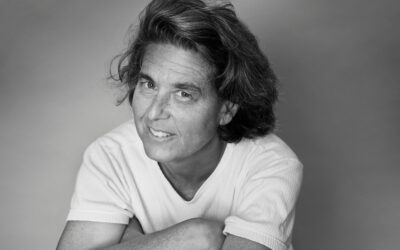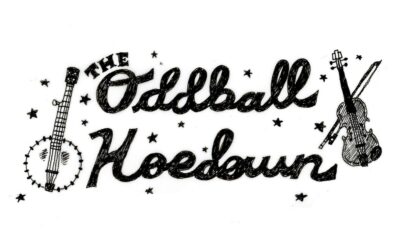The first thing I noticed on the way to the first event I attended at my first-ever Unbound Book Festival was the groups of men with buckets at the intersection of 9th and Broadway in Columbia, Missouri. If they weren’t frat boys, they sure seemed like it — matching quarter-zip pullovers, easy charm, acting like they owned the street. They were rather aggressively collecting money for one charity or another, in some kind of competition. Their cries and pestering would be a refrain throughout my weekend at Unbound, but so would restaurant recommendations from lovely locals. It’s all in the fun of a book festival doing the noble work of full community activation.
Take the festival’s first event, the Friday night keynote. Where the chumminess of the frat boys felt performed, the chumminess of headliners Ross Gay and Patrick Rosal was enough to make the packed Missouri Theater feel more like a bar or a barber shop. The two longtime friends invited the audience to bask in the warmth of their kind rapport, with Gay draped over his armchair, his lanky frame so comfortable as to create a kind of intimacy. This was an author talking to his friend; I got the feeling the conversation about art, inspiration and teachers would’ve sounded the same whether the writers were on a historic stage or a living room sofa.
Then it was my turn to talk to a friend onstage: my first author event was a conversation with festival director Alex George about my book How to Resist Amazon and Why, as well as independent bookselling in general (both George and I own bookstores in Midwestern college towns). This year, Unbound curated a series of author talks called Pen Pals, bringing together authors who are friends for on-stage conversations. While my talk with Alex wasn’t in the Pen Pals category, it may as well have been. Alex made me feel right at home with easy conversation and visible passion for books. This can often happen to authors in the hands of good event hosts, but the special thing about Alex is that he, through his festival, managed to make every Unbound attendee feel like that, or so it seemed to me. Our spirited discussion preceded an even more spirited audience Q&A, with a full crowd sending both of us feisty questions from their perches on the — you guessed it — comfy sofas of the smaller theater at Columbia’s funky Ragtag Cinema.
After the fun at Ragtag, I headed down the street to Top Ten Wines, which was kind enough to let poets take over their space for an entire day. The dusty and charming wine shop, with little stools and, of course, over-stuffed leather sofas, managed to host 12 poets across four hourlong chunks. What wine shop in America could claim as much? And what a lineup — from my new friend Jennifer Maritza McCauley, with whom I shared a delightful ride from the Kansas City Airport, to my own block of poets, which found me reading alongside two poet laureates: Maryfrances Wagner of Missouri, and Nnandi Comer of Michigan. That you could find such dignitaries of poetry before an intimate crowd speaks to the imaginative, community-first programming of Unbound. Poetry thrives when it can move off the college campus, and Unbound knows this. Still, I was nervous. And that was before I got to the mic and saw Ross Gay and Patrick Rosal in the audience, sprawled across those leather sofas.
Fittingly, my Unbound began and closed with Ross Gay, the patron saint of ecstatic gratitude. Just as my gratitude for a lively and community-focused day of literary programming was reaching its apex, I headed to Serendipity, a beauty salon that somehow features a ballroom. It was there that Gay would attempt a poetic marathon — to read the entirety of Be Holding, his revelatory 2020 book-length poem about Julius Irving and so much else. After a quick intro, Gay gave a self-effacing warning that there probably wouldn’t be time for questions and launched into the poem. The next hour was the most captivating and emotional live poetry experience I’ve ever had. To hear Gay stretch out into that poem, with all its punchlines and observations and heartbreak, was to see a master at work. To see it in the back of a beauty salon in a small Missouri college town was a testament to the fine minds of our region, using their creativity and panache to make literary happenings happen. And I’m grateful for that.



